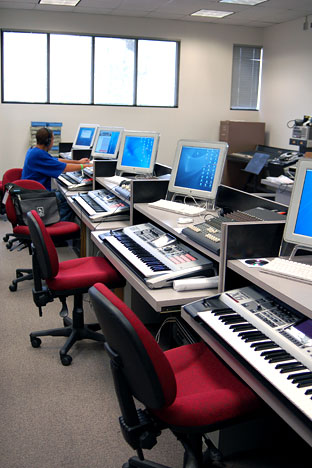Creative Solutions For Inspired Learning
Menu
Creative Solutions For Inspired Learning
Menu
Teachers call all the time asking for information on “music technology.” For starters, the most important thing to do is to find out how that teacher defines music technology. Most often this discussion goes in one of two directions: the piano lab or the technology lab.
Traditional music teachers may consider music technology to be the use of digital pianos or electronic keyboards to teach piano pedagogy. Sometimes this can include using a lab controller connected to digital pianos. And it may include some kind of software or MIDI file player to play or store the student's work. Some Roland digital pianos come with a variety of features, including onboard USB drives and sequencing capabilities. Although many piano teachers define these features as technology, they are used primarily for the development of piano skills.
Those who are developing Technology Labs have a broader definition of music technology. Music Technology can include anything from MIDI sequencing to using alternate MIDI controllers in performance to hard disk recording and multimedia projects. While the piano is central to the “Piano Lab” mindset, the computer is the essential element in the “Tech Lab” mindset.
A typical music tech lab has these essential elements: computers, synthesizers, and software. This is the essence of the technology lab. Computer lab stations can be used to teach a wide variety of topics, from music theory to composition, even lessons on other instruments. In addition, your computer is flexible enough to be used for recording and orchestration. Many tech teachers are including classes in multimedia or digital arts.
While a piano lab will typically involve a teacher controlling the class from one central station, a tech lab generally involves a teacher who “roams” the room as students work independently. This can be an adjustment for the traditional teacher, but is in keeping with integrated teaching methods being used across academic lines.
As a manufacturer, Roland is not only interested in both the traditional piano lab and the technology lab, but is also interested in where these labs can overlap. Many of our digital pianos are equipped with USB for easy connection to a computer. While digital pianos are much larger than the synths in a lab station, this may be optimal for the teacher who wants the flexibility of a good performance keyboard that can also be used in a lab set up.
In addition, Roland has a lab controller (the RCS-848) that is modular, allowing the teacher to introduce a cost-effective piano or technology lab with as few as eight stations. As the department grows or changes, additional boards can add eight more stations at a time at a price that is a fraction of most lab controllers on the market. This controller is great for the traditional piano teacher, but also good for the tech lab teacher who wants to be able to audition individual student projects remotely and share them with the class.
Having a clearly defined vision of the goals you plan to achieve is the first step you must take to be a successful music tech teacher. Knowing what it is you want and going after it in small incremental steps is the way to get there. Also, it’s important to know where to go for help – and to know that Roland is there to help you all the way!